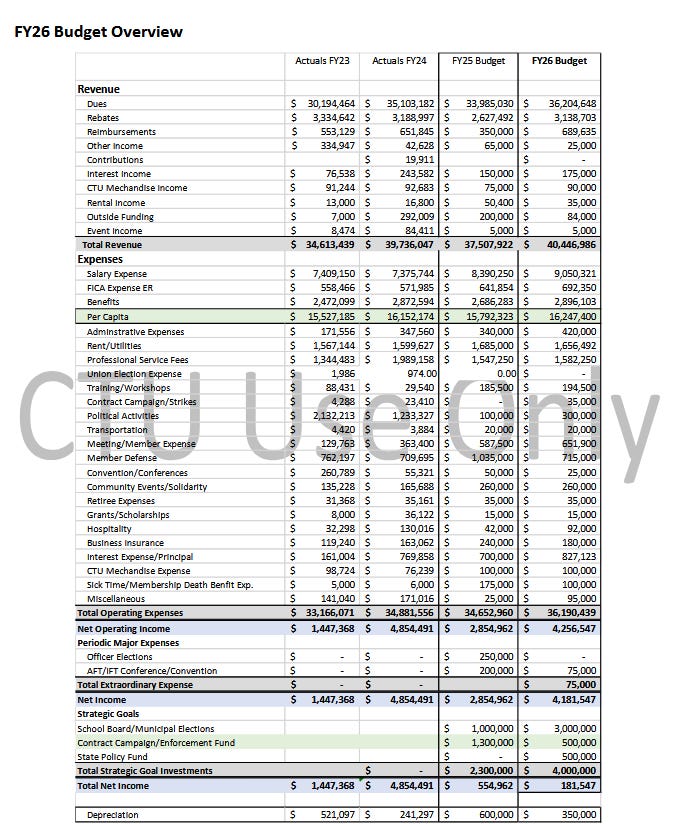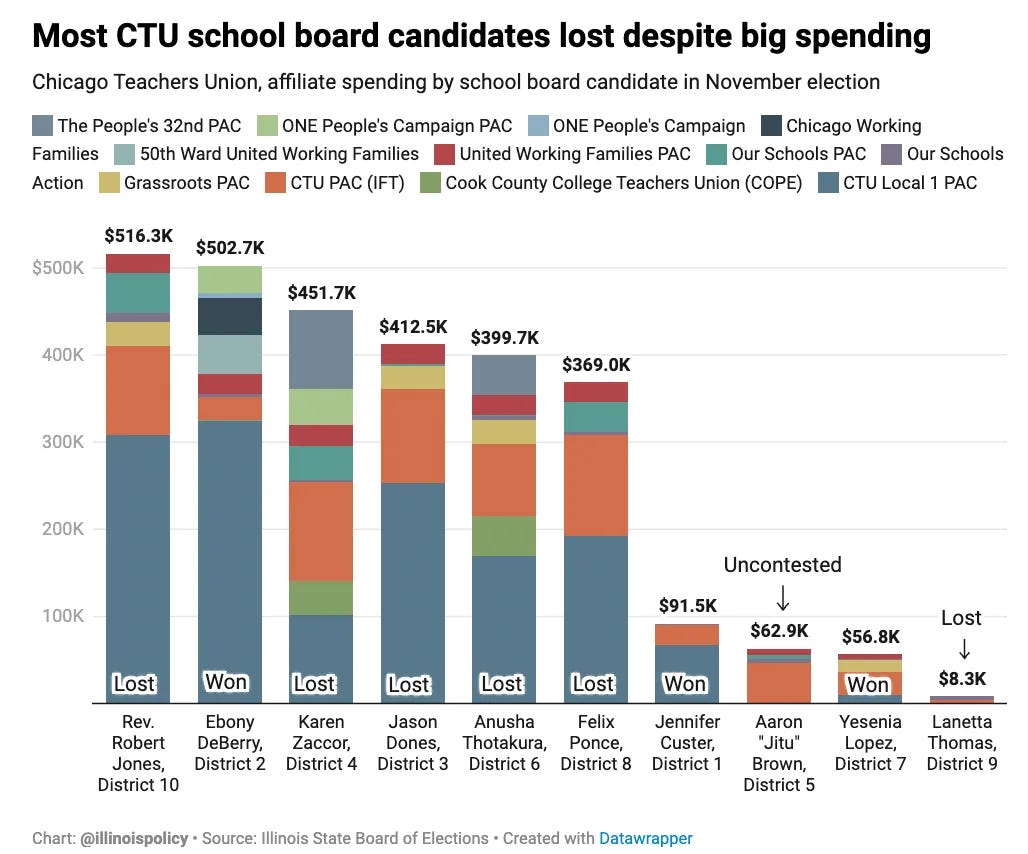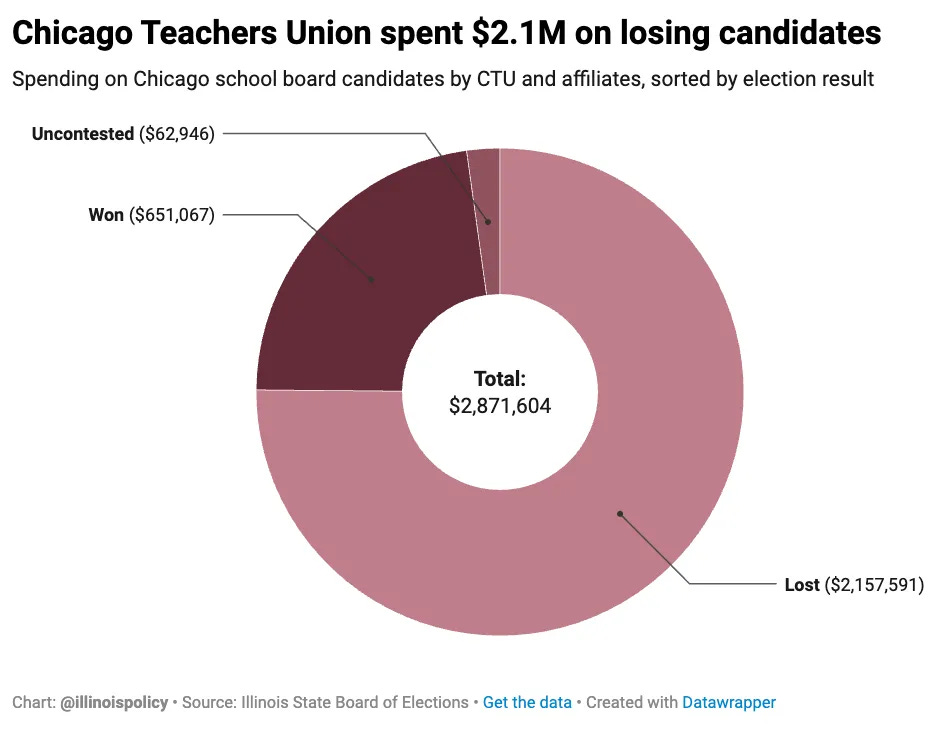Leaked budget: Chicago Teachers Union plans to spend $4M on local races
The document outlines next year’s priorities for the top political spender in Chicago. But CTU money has become a double-edged sword.

The Chicago Teachers Union plans to spend more than $4 million on local politics ahead of the next mayoral election, according to a leaked internal budget document shared with The Last Ward. The budget also shows record spending on union overhead and officer salaries.
But how much influence that political spending will actually create remains unclear, with recent races suggesting CTU money carries more baggage with Chicago voters than ever before.
Let’s dive in.
The topline budget summary shows CTU plans to spend on:
“School Board / Municipal Elections”
$1 million in FY 2025 and $3 million in FY 2026.
This money will likely flow to candidates for the November 2026 school board races, when voters will choose all 20 board members and a board president elected citywide.
It could also go toward Chicago City Council candidates ahead of the February 2027 municipal election, as well as Mayor Brandon Johnson’s re-election campaign.
“State Policy Fund”
$500,000 budgeted for FY 2026.
This will likely be used to pressure state lawmakers to pass new tax hikes and borrowing authority for Chicago Public Schools, which is currently the second-largest junk bond issuer in the country, behind Puerto Rico.
“Political Activities”
The union plans to spend $400,000 on miscellaneous political activities.
It’s unclear how this line item differs from other political spending, as the union recorded more than $3.3 million in “political activities” for FY 2023 and 2024.
The budget also reveals unprecedented spending on CTU overhead, with the FY 2026 budget including more than $9 million for union officer salaries, a 22% increase compared with FY 2023.
Can members trust these numbers?
Union members and the public should take these numbers with a grain of salt.
It’s not clear how the union actually spends its $40 million annual budget, because President Stacy Davis Gates and Vice President Jackson Potter have refused to produce an audit for four years running, despite a requirement to do so in the union’s own handbook.
A group of CTU members who have requested these audits for years were forced to sue the union last year, represented by the nonprofit Liberty Justice Center. CTU leadership asked the judge to dismiss members’ lawsuit, but failed.
This budget may also provide an incomplete picture of the total political dollars under Gates’ and Potter’s direction over the next two years.
The Illinois Federation of Teachers, parent union of the CTU, will replace its president and fill three vacancies on its executive board in October. Gates is rumored to be in line for the presidency, which could empower her and Potter to funnel statewide teacher dues into Chicago elections.
But that spending could hurt some candidates more than it helps.
What does CTU’s political money buy?
Chicagoans love their teachers, but not the union’s militant leadership, and not former CTU organizer Brandon Johnson. And that’s having downstream political consequences.
Under the leadership of Gates and Potter, CTU has become the city’s No. 1 spender on politics. But a long list of controversies have made the union toxic with a record share of Chicago voters – just 29% had a favorable opinion of the union, according to January polling. Meanwhile, 60% had an unfavorable opinion (-31 net). Asked about Gates specifically, 18% had a favorable opinion while 55% had an unfavorable opinion (-37 net).
The Wall Street Journal editorial board described backlash against the union in its post-mortem on the “Bring Chicago Home” tax increase proposal, which Chicagoans rejected at the ballot box last year, writing:
On Tuesday voters shocked everyone by soundly rejecting a ballot referendum to raise the city’s real-estate transfer tax, despite active support by Mayor Brandon Johnson and the Chicago Teachers Union (CTU). Or perhaps the defeat was because of their support … The vote shows the CTU is beatable.
CTU money also played an outsized role in the November school board elections, which we analyzed over at the Chicago Policy Center.
School board candidates backed by teachers unions have overwhelming odds in their favor, winning 70% of their races nationally. So CTU should have expected to win six of the nine competitive seats in November. But CTU-backed candidates lost six of the nine seats and fared even worse in their biggest-spending races, losing five of six contests in which the union and its affiliates put up more than $200,000 for a given candidate.
Our analysis found that across 12 CTU-backed political entities, the union spent nearly $2.9 million on school board races. Of that amount, more than $2.1 million (75%) went to losing candidates.
Where does CTU’s money come from?
The vast majority of the union’s $40 million annual budget comes from teacher dues, which are garnished directly from worker paychecks by Chicago Public Schools and transferred to the union. However, the landmark Supreme Court decision Janus v. AFSCME held in 2016 that public-sector workers cannot be fired for refusing to pay money to a union. To comply with the Janus case, CTU provides a short window of time in which members can opt out and cease paying dues. That window is in August of each year, and teachers interested in opting out can visit LeaveCTU.com to do so.
In the news
I joined the Mincing Rascals Podcast on WGN last week to discuss the Colbert controversy, cane sugar, Coldplay, and the upcoming budget fight in Chicago City Council. My “green light” recommendation: Empires of Light: Edison, Tesla, Westinghouse and the Race to Electrify the World by Jill Jonnes. Special thanks to the brilliant Prof. Lynne Kiesling for recommending this book. If you’re into energy, check out her Substack Knowledge Problem.





Thanks Austin! Just unbelievable -- the arrogance of the leaders of the CTU, the apathy of Chicago citizens and the ignorance of the voters in Chicago.
Stacy Davis Gates is probably using union member's dues to pay her water bills.